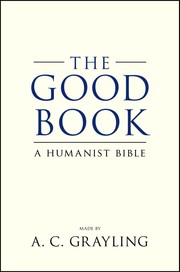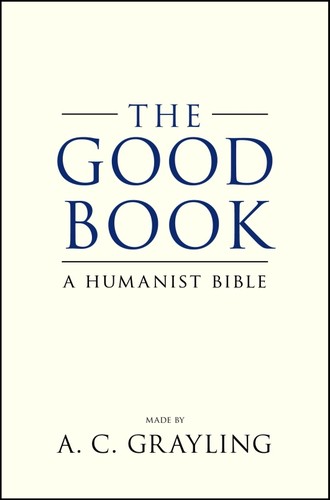Check nearby libraries
Buy this book

From the publisher's website: https://www.bloomsbury.com/us/the-good-book-9780802778383/
Few, if any, thinkers and writers today would have the imagination, the breadth of knowledge, the literary skill, and-yes-the audacity to conceive of a powerful, secular alternative to the Bible. But that is exactly what A.C. Grayling has done by creating a non-religious Bible, drawn from the wealth of secular literature and philosophy in both Western and Eastern traditions, using the same techniques of editing, redaction, and adaptation that produced the holy books of the Judeo-Christian and Islamic religions. The Good Book consciously takes its design and presentation from the Bible, in its beauty of language and arrangement into short chapters and verses for ease of reading and quotability, offering to the non-religious seeker all the wisdom, insight, solace, inspiration, and perspective of secular humanist traditions that are older, far richer and more various than Christianity. Organized in 12 main sections----Genesis, Histories, Wisdom, The Sages, Parables, Consolations, Lamentations, Proverbs, Songs, Epistles, Acts, and the Good----The Good Book opens with meditations on the origin and progress of the world and human life in it, then devotes attention to the question of how life should be lived, how we relate to one another, and how vicissitudes are to be faced and joys appreciated. Incorporating the writing of Herodotus and Lucretius, Confucius and Mencius, Seneca and Cicero, Montaigne, Bacon, and so many others, The Good Book will fulfill its audacious purpose in every way.
Check nearby libraries
Buy this book

Previews available in: English
| Edition | Availability |
|---|---|
|
1
The Good Book: A Humanist Bible
2011, Walker & Company
Hardcover
in English
0802717373 9780802717375
|
aaaa
|
Book Details
Edition Notes
Classifications
The Physical Object
Edition Identifiers
Work Identifiers
Source records
marc_openlibraries_sanfranciscopubliclibrary MARC recordMarygrove College MARC record
Internet Archive item record
Library of Congress MARC record
marc_columbia MARC record
harvard_bibliographic_metadata record
Excerpts
2. Its fruit is knowledge, teaching the good gardener how to understand the world.
3. From it he learns how the tree grows from seed to sapling, from sapling to maturity, at last ready to offer more life.
4. And from maturity to age and sleep, whence it returns to the elements of things.
5. The elements in turn feed new births; such is nature's method, and its parallel with the course of humankind.
6. It was from the fall of a fruit from such a tree that new inspiration came for inquiry into the nature of things,
7. When Newton sat in his garden, and saw what no one had seen before: that an apple draws the earth to itself, and the earth the apple,
8. Through a mutual force of nature that holds all things, from the planets to the stars, in unifying embrace.
9. So all things are gathered into one thing: the universe of nature, in which there are many worlds: the orbs of light in an immensity of space and time.
10. And among them their satellites, on one of which is a part of nature that mirrors nature in itself,
11. And can ponder its beauty and significance, and seek to understand it: this is humankind.
12. All other things, in their cycles and rhythms, exist in and of themselves;
13. But in humankind there is experience also, which is what makes good and its opposite.
14. In both of which humankind seeks to grasp the meaning of things.
This is the entire first chapter of the first book of "The Good Book".
Community Reviews (0)
| December 13, 2019 | Edited by MARC Bot | import existing book |
| November 16, 2019 | Edited by Hardhead4948 | I corrected several spelling errors. |
| November 16, 2019 | Edited by Hardhead4948 | Edited without comment. |
| November 13, 2019 | Edited by Hardhead4948 | I took out the sloppy linebreaks that were inserted at the publisher's site. It makes the review a lot nicer looking. |
| August 6, 2012 | Created by Ludovicus | Added new book. |










